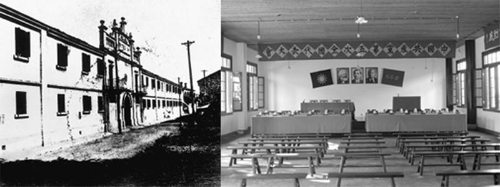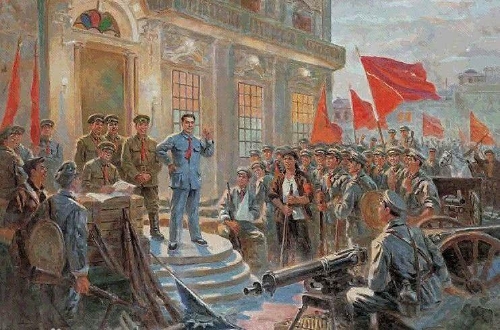1927
2021-04-26 07:08:22
April 27-May 9,1927
The CPC held its Fifth National Congress in Wuhan. Eighty deputies attended the congress, representing over 57,900 Party members. The participants concentrated on discussing the Party's tasks at the critical moment.They accepted the resolution on the Chinese revolution adopted at the Seventh Enlarged Plenary Meeting of the Communist International Executive Committee. In view of what he had done in political struggles, they criticized Chen Duxiu for his Right deviationist mistakes as manifested in his neglect of the struggle with the bourgeoisie for leadership over the revolution. But they did not put forward any practical measures for correcting the mistakes. In the “Resolution on the Political Situation and the Party's Tasks” adopted at the congress, the Party made no concrete analysis of the situation in conformity with the reality,although it pointed out that since the May 30 Movement, it had “paid attention only to the struggle against imperialism and the warlords to the neglect of the struggle with the bourgeoisie for leadership over the revolution," so that it had failed to stop Chiang Kai-shek's betrayal. Moreover,in the resolution Chiang's betrayal was taken as betrayal by the bourgeoisie as a whole, as a result of which the national bourgeoisie was placed on a par with the comprador bourgeoisie and was regarded as the target of the revolution, too. And the KMT and the government in Wuhan, that were already under the control of Wang Jingwei and Tang Shengzhi,were regarded as the allies of the workers, the peasants and the petty bourgeoisie, and great hopes were pinned on Wang and Tang.The“Resolution on the Question of Land" adopted at the congress repeatedly stressed the importance of the agrarian revolution, maintain- ing that in the provinces “controlled by the revolutionary National Government,"the agrarian revolution could be carried out intensively. But it did not see that the force controlling the KMT and the government in Wuhan could not possibly be a supporter of the peasant movement. The congress emphasized the importance of winning leadership for the proletariat, setting up revolutionary democratic government and carry- ing out the agrarian revolution, but it did not work out effective and practical measures in the light of the critical situation in the revolution to solve the questions of how to win leadership by the proletariat over the revolution, how to lead the peasants in the agrarian revolution, what attitude to take towards the government and the KMT in Wuhan, and particularly how to build the Communist-led revolutionary armed forces.The congress elected the Central Committee composed of 29 members and 11 alternate members. The members of the Central Com- mittee then elected Chen Duxiu,Zhang Guotao,Li Weihan,Cai Hesen, Li Lisan,Qu Qiubai and Tan Pingshan as members, and Su Zhaozheng, Zhang Tailei,Chen Yannian and Zhou Enlai as alternate members, of the Political Bureau;Chen Duxiu, Zhang Guotao, Cai Hesen and Qu Qiubai(Li Weihan was added later) were elected members of the Political Bureau Standing Committee.Chen Duxiu was elected general secretary again.
August 1,1927
In accordance with the decision of the CPC Central Committee and under the leadership of Zhou Enlai, secretary of the Party's Front Committee, He Long, Ye Ting, Zhu De, Liu Bocheng and others, over 20,000 men of the National Revolutionary Army and other armed forces, who were either led or influenced by the Chinese Communist Party, staged an armed uprising in Nanchang, Jiangxi Province, and occupied it. This uprising fired the first shot of armed opposition to the KMT reactionaries, ushering in a new period in which the Chinese Communist Party exercised independent leadership over revolutionary armed struggles and founded the people's revolutionary army. Beginning on August 3, the Front Committee led the army units to withdraw from Nanchang according to the original plan of the CPC Central Committee. Owing to lack of experience, the insurgent forces failed to join with the peasant movement in Jiangxi and other provinces and therefore they were besieged and defeated by superior enemy forces in late September and early October in the Chaozhou-Shantou area when they were moving southward to Guangdong. Part of the troops that had survived shifted to the Haifeng-Lufeng area to continue the fight, while the rest, commanded by Zhu De and Chen Yi, switched to southern Fujian and Jiangxi and the Guangdong-Jiangxi border area to engage in guerrilla operations there.


